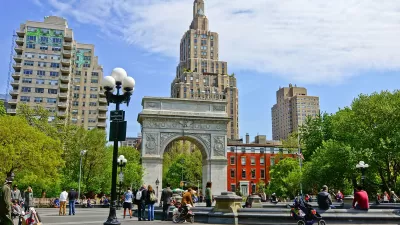In the aftermath of the Boston Marathon bombings, Eric Jaffe explores how cash-strapped cities will handle terrorism. "The short answer is public surveillance cameras. The long answer is smarter public surveillance cameras."
Jaffe reports from the New York Ideas festival, where NYPD Commissioner Ray Kelly explained how New York City has managed to maintain vigilent in combating terrorism despite having 6,000 less officers than it did a decade ago. "[A]n intricate system of cameras and license-plate readers," which covers Lower Manhattan and is being expanded to midtown and other "vulnerable" parts of the city, has been integral to their efforts.
"Part of what makes this strategy so efficient, despite a reduction in the size of the police force, is that cameras are handling more of the workload on their own," says Jaffe. "Analytics enable the cameras to see something and say something, if you will: they can determine if a package has been left in a particular spot for a long period of time, for instance, and track back through files to find a person wearing a certain color shirt."
However, as Sean Gallagher explains in Ars Technica, technology (and facial recognition software specifically) clearly failed in the search for the Boston bombing suspects. "Under the best circumstances, facial recognition can be extremely accurate, returning the right person as a potential match more than 99 percent of the time with ideal conditions," he says. "But to get that level of accuracy almost always requires some skilled guidance from humans, plus some up-front work to get a good image." Let's just hope those skilled humans aren't being furloughed when they're needed.
FULL STORY: How Cash-Strapped Cities Will Handle Terrorism

Maui's Vacation Rental Debate Turns Ugly
Verbal attacks, misinformation campaigns and fistfights plague a high-stakes debate to convert thousands of vacation rentals into long-term housing.

Planetizen Federal Action Tracker
A weekly monitor of how Trump’s orders and actions are impacting planners and planning in America.

San Francisco Suspends Traffic Calming Amidst Record Deaths
Citing “a challenging fiscal landscape,” the city will cease the program on the heels of 42 traffic deaths, including 24 pedestrians.

Defunct Pittsburgh Power Plant to Become Residential Tower
A decommissioned steam heat plant will be redeveloped into almost 100 affordable housing units.

Trump Prompts Restructuring of Transportation Research Board in “Unprecedented Overreach”
The TRB has eliminated more than half of its committees including those focused on climate, equity, and cities.

Amtrak Rolls Out New Orleans to Alabama “Mardi Gras” Train
The new service will operate morning and evening departures between Mobile and New Orleans.
Urban Design for Planners 1: Software Tools
This six-course series explores essential urban design concepts using open source software and equips planners with the tools they need to participate fully in the urban design process.
Planning for Universal Design
Learn the tools for implementing Universal Design in planning regulations.
Heyer Gruel & Associates PA
JM Goldson LLC
Custer County Colorado
City of Camden Redevelopment Agency
City of Astoria
Transportation Research & Education Center (TREC) at Portland State University
Jefferson Parish Government
Camden Redevelopment Agency
City of Claremont




























